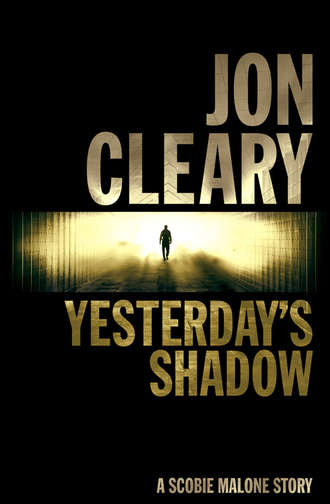
Полная версия
Yesterday’s Shadow
Malone said, ‘While you were waiting for the taxi, did you see anyone come out of the hotel?’
If Delia was remembering anything it wasn’t what she saw outside the hotel last night; she had a faraway look, remembering the distant past. Remembering the bruising Malone had given her when he had jilted her? Then her gaze focused and she looked at Gail and said, ‘What?’
‘Inspector Malone asked you a question,’ said Gail.
‘Oh.’ Then she looked at him again, this time almost impersonally. He repeated his question and she said, ‘Yes, a man.’
‘Can you describe him?’
She shook her head. ‘Only vaguely. A taxi pulled up and he tried to grab it. But I got the door open first –’ Now she gave him a very personal look, leaning forward. ‘I wasn’t thinking too clearly, Scobie – you can understand that, can’t you? You must know how in shock I was?’
He didn’t ask how he was expected to know: he knew.
He said nothing, and she went on, ‘Why do you want to know about the man?’
‘The other murder?’ said Rosie Quantock, who had been silent too long.
‘Would you recognize him again if you saw him?’ Malone said.
‘Would it help you if I did?’
‘Hold on a minute,’ said Pam Morrow. ‘You’re not using Delia as a witness to that case while we’re still talking about her own case.’
‘No, I’d like to help,’ said Delia, looking directly at Malone as if they were alone in the room.
She’s too eager, he thought. But he said, ‘Go on.’
‘He was, I dunno, medium-sized. Not as tall as you, not as beefy –’
‘Thank you.’ He didn’t grin, but the four women did.
‘Well, you’re not beefy, I suppose. You haven’t changed much, really. Anyhow, he was slimmer than you. Or I think he was – he was wearing an overcoat, a dark one. And a hat.’
‘What sort of hat?’
‘I dunno. Just a hat. Not one of those broad-brimmed ones, the Akubras. I wasn’t looking at him to remember him –’ For the first time she sounded testy; he remembered she could get short-tempered about small things. But never the larger things, like being jilted … ‘I’ll remember him if I see him again.’
‘It could’ve been one of the hotel workers,’ said Gail. ‘Going off duty. Do you know any of them?’
Delia shook her head. ‘No. I’ve never been near the hotel till last night. Boris never wanted me anywhere near where he worked.’
‘Didn’t want his mates to see he was a wife-basher,’ said Rosie Quantock. ‘A real bastard. Bottom of the heap.’
‘How long had he been working at the hotel?’
‘Two – no, three months. He lost his last job – he worked for a bricklayer. They didn’t get on.’
‘He bashed him, too.’ Mrs Quantock couldn’t help being helpful.
‘I think this has gone on long enough,’ said Pam Morrow and snapped shut her briefcase as if to close all argument. ‘Are you going to charge my client?’
‘Yes,’ said Malone, not looking at Delia. ‘She’ll be held here overnight and arraigned tomorrow morning, probably down at Liverpool Street.’
‘What about bail?’
‘That’ll be up to the Crown Prosecutor. We won’t oppose it.’
‘Thanks, Scobie.’ Delia reached across and pressed his hand. He felt an inward flinch, but didn’t draw his hand away.
‘How’s she gunna raise bail?’ demanded Rosie Quantock. ‘She hasn’t got a cracker, nothing.’
‘Do you own your own house?’ asked Gail.
It was Mrs Quantock who answered, with a loud dry cackle. ‘She’s renting, for Crissake! She’d have trouble raising a hundred dollars –’
‘Rosie, please –’
‘No, love. This is no time for bloody embarrassment. That arsehole’s given you nothing –’
Malone turned to Pam Morrow. ‘Can the Women’s Protection League help?’
‘We’ll see. We’ll plead self-defence, so maybe the beak will be lenient. If he is, we can cover it.’
Malone stood up, switched off the recorder. ‘I’m sorry, Delia.’
She looked up at him. ‘For what?’
He left that unanswered.
4
He went home in gathering darkness that suited his mood. He always looked forward to coming home to the house in Randwick; he valued home, like a comforting mental condition. It wasn’t just the love he found there under the Federation gables but the normality; when he stepped in the front door and closed it behind him he was shutting out Crime, with a capital C. Not that Crime in today’s world was abnormal. It was just that, most days, he didn’t have to bring it home with him.
‘Another bad day?’ said Lisa as he kissed her cheek.
Women, he was convinced, were born with antennae hidden somewhere in their secret skulls. ‘What about you?’
She had worked for the past three years as a public relations officer at Town Hall. Her original assignment had been with the Olympics, but that long headache was now past; the Olympics had been a success, two weeks of excitement and euphoria, and now the city was slowly and reluctantly adjusting to the downturn in the boom. Like the post-coital blues, she had described it to him, though she had never put that in one of her press releases.
She was at the fridge, taking out the beef burgundy she had prepared last night. ‘Half an hour to dinner. I just have to heat everything. Open the wine.’
They were alone in the kitchen. This was family night. Claire and her husband Jason, Maureen and Tom would all be here for dinner. Claire had been married a year; Maureen had moved out to live with two girlfriends earlier this year; Tom, who loved a new girl every week but loved his mother’s cooking more, was still living at home. Malone knew how fortunate he was to have a family that was not dysfunctional.
‘Nobody’s here yet?’
‘No. You want to shower before they arrive? Tom rang to say he’s on his way.’ Tom was in his last year of Economics at university. ‘He had a date with his tutor.’
‘A date with his tutor?’
‘She’s twenty-eight and a dish, he says. I don’t think he’s doing market research with her. Or maybe he is. Move over.’
He shifted along the kitchen bench to make room as she put vegetables into a pot. He picked up one of the two bottles of red wine, then put it down, folded his arms and leaned back against the bench. At ease – like hell: ‘I met an old girlfriend today.’
‘Which one?’ Sounding as if he had told her he had met an old pet dog. Or bitch.
‘Delia Bates.’
Then she looked at him, her hands about to open a bag of rice. ‘Ah.’
‘That all you have to say?’
‘Till I hear what else you’re going to say.’
Women: they could weave barbed wire out of words. ‘We’re holding her for homicide. She stabbed her husband this morning.’
She cut the bag of rice, with a knife. ‘Will she get off?’
‘I dunno. They’re pleading self-defence.’
‘How did she feel? I mean, you arresting her?’
‘I didn’t take her in. Phil Truach did that. I interviewed her. She won’t talk to anyone but me.’
‘That must have been nice.’ She poured the rice into a dry saucepan, white B-B bullets that hit the metal with a clatter. She put down the knife, a long-bladed kitchen knife with blood on it. ‘Or was it uncomfortable? I would have been if I’d been there.’
‘You weren’t there! I’m more uncomfortable right now. Christ, darl, imagine how I felt –’
‘I am.’ She put the saucepan down on the bench, gave him her full attention. ‘She was in love with you, once.’
‘Christ, what a memory!’ Foolishly, he was getting angry. ‘Twenty-five years ago.’
Delia had been the only girl he had ever talked about. Not at length and reluctantly, as if (he thought now) there had been guilt at leaving Delia. It seemed, now, that Lisa remembered what he had forgotten. Women and elephants … but now was not the time to voice that comparison. He was already offside in the argument.
‘That’s what I’m thinking about,’ said Lisa. ‘You come home and tell me about a domestic, your girlfriend of twenty-five years ago killing her husband, and you don’t mention the other homicide that’s been on the news all day. The murder of the wife of the American Ambassador. Or aren’t you on that one?’
Then the cavalry’s bugle blew; or the doorbell rang. ‘I’ll get it,’ he said and almost galloped down the hallway to open the door to Maureen, Claire and Jason.
The girls kissed him; Jason shook hands. His son-in-law was three or four inches taller than he, had bulked out since his marriage; Claire was as good a cook as her mother. His mother was in jail, doing life for, with her lesbian lover, having murdered Jason’s father. Malone suddenly determined there would be no further talk this evening of domestics. He had warm affection for Jason and suddenly was protective of him.
Maureen, the TV researcher for Four Corners, was not interested in domestics or small talk. If and when she married, her husband had better not bring his secrets with him. ‘How about that homicide, the Ambassador’s wife? Are you on it, Dad?’
‘Unfortunately. Excuse me, I’ll have a quick wash under the armpits. I’ve just got in.’
He peeled off into the bathroom, pondered for a moment taking a three-hour soak in the bath. Instead, he stripped off his shirt, had a quick swab under the armpits, washed his face, dried himself, then looked in the mirror. Transfer tomorrow, he told himself. Fingerprints, Traffic. Anywhere to get out of Homicide.
He put on a clean shirt and a jumper. When he went out to join the family, Tom was just coming in. He wore jeans, a black leather jacket and carried his motorcyclist’s helmet under his arm like a big black skull. He, too, was taller than Malone. Little Me, thought Malone, and felt self-sympathy itching like a rash.
He helped Maureen get the drinks. She was an attractive girl, dark-haired and good-figured and, Malone guessed, she wore her boyfriends out with her restless energy. He sometimes wondered where she got it from. ‘Who dunnit? The Ambassador?’
‘Don’t joke, Mo. None of your ABC anti-US bias.’
‘We’re impartial. We’re anti-everyone but ourselves.’
‘Relax, Mo,’ Claire told her sister. She had her mother’s blonde looks and composure; their Zuyder Zee look, as Tom called it, never making more than small waves. ‘You’re not on camera now. Is it going to be tough, Dad?’
He nodded, sipped his beer. The three men were drinking beer; the two girls were on white wine. Out in the kitchen the cook was probably swigging sweet sherry. All at once Malone began to laugh.
‘What are you laughing at?’
‘Nothing, Just a thought.’ He took another sip of his beer, then said, ‘It’s going to be tough. You media are going to make a meal of it, Mo.’
‘I know. News are already running around hooting their heads off.’ Four Corners, the show she worked on, never ran around hooting; it took its time doing demolition jobs on corruption, maladministration and unsocial justice. He hoped it would never come within coo-ee of the Pavane murder. ‘You’re in for it, Dad. Sorry.’
‘Are the Americans co-operating?’ asked Tom. ‘You got the CIA, the FBI on your back?’
‘No, they know it’s our turf.’
‘Dad,’ said Maureen, ‘if we decide to look into Australian–American co-operation or lack thereof –’
‘Raise that question again and I’ll find something to pin on you, okay?’
‘Lay off, Mo,’ said Claire. ‘You’re so bloody morally correct since you joined the ABC –’
‘Let’s all lay off,’ said Malone. ‘How are you making out with your tutor, Tom?’
‘Who told you about her? Mum, I’ll bet –’
‘You’re dating your tutor?’ both his sisters asked. ‘You’re going for an older woman? What’s she teaching you?’
‘How to be economical in bed?’ suggested Jason.
This is what I like to hear, thought Malone, family chi-acking. No violence, no bashing … Then Lisa came to the doorway. ‘Dinner is ready if you layabouts are?’
The girls were instantly on their feet, rushing to help her. The three of them went out to the kitchen, Tom went in to have a quick shower (where’s he been? thought Malone. In the tutor’s bed?) and Jason picked up the glasses and put them on a tray.
‘How’s work?’ Malone asked.
‘Quiet, there’s not much around.’ Jason was an engineer with a large construction company. Since the Olympics there had been a general turn-down, a bubble deflated if not entirely pricked. ‘I take it yours is not going to be? Quiet, I mean.’
‘Quiet? Oh, we’ll keep it that way as long as we can, our end. But the bloody media …’ He stood up, suddenly feeling weary again, put his empty glass on the tray. ‘How’s your mum?’
‘I dunno. Philosophical, I guess you’d call it. She never mentions Dad, though. Nor Angela Bodalle, for that matter.’ Olive Rockne’s lesbian lover and fellow murderer was doing her time in another jail. ‘Mum hopes to be out in eighteen months. She’s been a model prisoner, they say.’ He paused in the doorway. ‘Do you ever think about her?’
‘Often – when I see you. I never got any pleasure from putting her away, Jay.’
‘I know that, Scobie. I’m just happy to have you as a father-in-law.’ Then he turned quickly and went out to the kitchen, the glasses rattling on the tray.
Malone gathered his feelings, which were suddenly like warm coals. Affection from the young is not a cheap gift.
Dinner was not as awkward as he had expected. The Pavane murder was discussed and everyone was sympathetic towards him for the headaches it promised. Lisa smiled at him from her end of the table, but (why was he so suspicious?) it could have been a public relations smile. The four young ones dominated the conversation, banter flying across the table like party crackers. It was only when relaxation had set in over coffee that Maureen said, ‘What about the other murder at the hotel, Dad?’
‘What about it?’
‘Are you on it?’
He looked along the table at Lisa and she gave him the same smile: it was a public relations smile, as empty as a clown’s laugh. ‘Yes, I’m on it. For the time being.’
‘It’s just an ordinary domestic,’ said Lisa, reaching for an after-dinner mint, biting into it as if it were part of him.
‘Then why are you on it?’ Claire looked at her father. ‘With this other big one?’
He looked along the table again at (Mona) Lisa: the smile was smaller this time. He didn’t know what made him say it: ‘I knew the wife, the one who did the killing. She was an old girlfriend.’
At which they all looked at Lisa, not him. Maureen said Wowie!, Tom smiled broadly, Jason looked as if he would rather be out on a construction site and Claire pursed her lips. Lisa finished the mint, repeated the Mona Lisa smile and said, ‘Small world, ain’t it?’
Claire looked at each of her parents in turn. ‘Which of you wants me to represent you? I think we’re heading for another domestic’
He cranked up a smile, gave it to Lisa along the table. ‘She’s been married twice since I knew her.’
‘She do them both in?’ said Tom.
Maureen hit him with her fist. ‘Pull your head in. This is serious. Why are you on the case, Dad? Just because she’s an old girlfriend?’
‘Golly,’ said Lisa, ‘I forgot to ask him that.’
‘No, I’m not.’ Then he began to wonder if he was. ‘She won’t talk to anyone else but me. Nobody else in Homicide.’
‘You can’t blame her for that, Mum,’ said Claire.
‘Who’s blaming her? Or anyone?’ She took another mint, bit into it.
‘Has she changed?’ asked Maureen the researcher. Get all the facts, we’ll sort ’em out later … ‘Would you have recognized her?’
‘In the street? No.’
‘Why did she kill her husband?’ asked Jason and it was obvious it was a difficult question.
‘He never reads reports of murder cases,’ said Claire, pressing his hand.
‘For obvious reasons,’ said Jason and for a moment the ceiling fell in.
‘Sorry,’ said Claire, squeezing his hand hard; then she looked around the table. ‘What else can we talk about? Who’s Randwick playing on Saturday?’
‘Eastwood.’ Tom played fullback for the local rugby club. ‘You coming?’
‘We’ll be there,’ said Jason who, like a good engineer, was sensitive to atmospheric pressure. ‘Let’s do the washing-up.’
He stood up, gathered some of the coffee cups and went out to the kitchen. The girls followed him, taking plates. Tom sat a moment, then he, too, rose and went out to the kitchen. Malone and Lisa looked at each other along the length of the table.
‘She hasn’t raised a spark in me,’ he said. ‘It was all over twenty-five years ago.’
‘I know that.’ The smile this time was her own; and his. ‘But if I told you I’d met an old boyfriend, what would you do?’
‘Pinch him. For loitering with intent.’ He got up, went along the table and kissed her. ‘I love you.’
‘Nice,’ said Claire from the doorway. ‘Now may I finish clearing the table?’
5
Billie Pavane’s murderer sat in his $400-a-night hotel room and looked out at the city that he had once hoped to conquer. Conquest of a city had been everyone’s (well, everyone he knew) ambition back in the eighties and it still lingered, like a pungent dope smell, even now in this first year of the new century. It was not only Sydney that had the infection: it was there in London, New York, Paris; it was there in Toronto where he now worked. He had read that the richest man in the world was now worth more than all but the six biggest economies and everyone (well, everyone he knew) thought Bill Gates was God, only richer. The old ambition was still there in Billie’s killer, like a dormant cancer: greed had once been good and, he heard it all the time, it was coining back into fashion. But not for him. He had a wife and three children (him: who had never wanted to be even a godfather) and they hamstrung him, if unwittingly, with their principles and decency. At least Billie (he had never called her that back in the old days) had had none of those handicaps, principles and decency, back when things had been going so right. Moralists of the world don’t realize the handicaps that pragmatists have to face.
He had left Sydney fourteen years ago with almost $500,000 as his share of the – well, call it scam, if you want to be moralistic. He had not been burdened with conscience; in the run-up to the 1987 crash no one could spell the word. He had said no when Billie (he would have to start thinking of her under that name) had told him she wanted to have his child; the last mantle he would have placed on her was that of motherhood. Parenthood, for Christ’s sake? He didn’t want to be a father, even if he didn’t have to live with her and the kids. He had paid for the abortion and been surprised when the doctor insisted on actual cash rather than Diners Club Card; he had lived to the extreme in those days on his credit card, flashing it like a fairy wand. Billie (would he ever get used to that name?) had been violently bitter when the abortion had gone wrong, as if he were to blame. He had never before seen that side of her. She had always been gay, conscienceless, in the Bollinger-bubble of all the money they had been making. The chill between them turned to freezing point and he wondered how he was going to get away from her. It was just then that he learned that a wise man from the East, from Bellevue Hill actually, had begun selling his holdings. If the richest man in the country was getting out of the market then it was clear, to everyone but the fools, that the boom would not last, as the fools predicted, till Christmas.
Without telling anyone, he had already transferred the bulk of his money to a bank in Liechtenstein. He sold up the rest of his holdings and without saying goodbye to anyone, least of all Billie, he had walked out of the office one Friday afternoon and caught a plane to Bangkok and from there to Paris. He had been good at French at school and he had kept up his study and practice of it because he liked the sound and nuances. Within a month of landing in Paris he had a job with a French bank as an investment adviser. He changed his name and his appearance. He had had the anonymous good looks of male models found in mail-order catalogues, spoiled only by a broken nose. He had worn the nose, broken in a university rugby match, as a badge of honour; it lifted the macho image of wheeling-dealing brokers. The nose was rebuilt, he had his hair cut short in the French style; he was still anonymously good-looking, but any visitor from Sydney would have to look twice at him to recognize him. He spoke French with barely an accent, not easy for an Australian – not the best linguists in the world. He dressed Parisian, even took on French manners. Sydney and everyone there, even his pharmacist father, with whom he never got on, and his sister, snug and smug in a happy North Shore marriage, began to fade from memory. He was as self-contained as he wished to be.
There were affairs, of course. Then one proved difficult and dirty. There was another abortion and the girl, from Brittany, a hard-headed region, threatened to go to the bank and denounce him if he did not marry her. Whether the bank would have listened to her was debatable; but, in a moment of Dom Perignon-induced weakness, beside her in bed, the worst place for secrets, he had told her things about his past that he thought she would never remember. He had forgotten, or didn’t know, that many Frenchwomen, inspired by Ninon de Lenclos, wrote diaries. He had resigned from the bank and left for Canada. He felt an utter bastard, but self-recognition does not necessarily mean being conscience-stricken. Guilt is only a comfort blanket for those who want to wear it.
In Toronto he went to work for another bank. It was not the most exciting city, especially after Paris, but he had had enough excitement for the time being. Then disaster, in the form of romance, struck: he fell, really, truly, in love. She was French-Canadian, Catholic, beautiful and she was helplessly in love with him. They were married when she was two months pregnant (the Quebec nuns had not taught her to keep her knees together) and he had settled into the sort of life he had laughed at back home. Upper middle class, country club, even church-going: sometimes he stepped outside himself and wondered what had happened to him. His hair began to turn grey, he had to watch his weight, he had two daughters and a son. The past slipped off the map of his life.
Then on a business trip to Chicago, sitting in a hotel room just like this one, he had switched on the television and seen an interview, relayed from Kansas City, with Billie (the first time he heard that name) and her husband, the ambassador-elect to Australia.
Just as today in this room he had switched on the television and on the midday news had seen the woman who had caught sight of him as he was about to step out of Billie’s room in that flea-bag hotel. There was no mistaking her. They had stared at each other long enough to identify each other.
Конец ознакомительного фрагмента.
Текст предоставлен ООО «ЛитРес».
Прочитайте эту книгу целиком, купив полную легальную версию на ЛитРес.
Безопасно оплатить книгу можно банковской картой Visa, MasterCard, Maestro, со счета мобильного телефона, с платежного терминала, в салоне МТС или Связной, через PayPal, WebMoney, Яндекс.Деньги, QIWI Кошелек, бонусными картами или другим удобным Вам способом.









